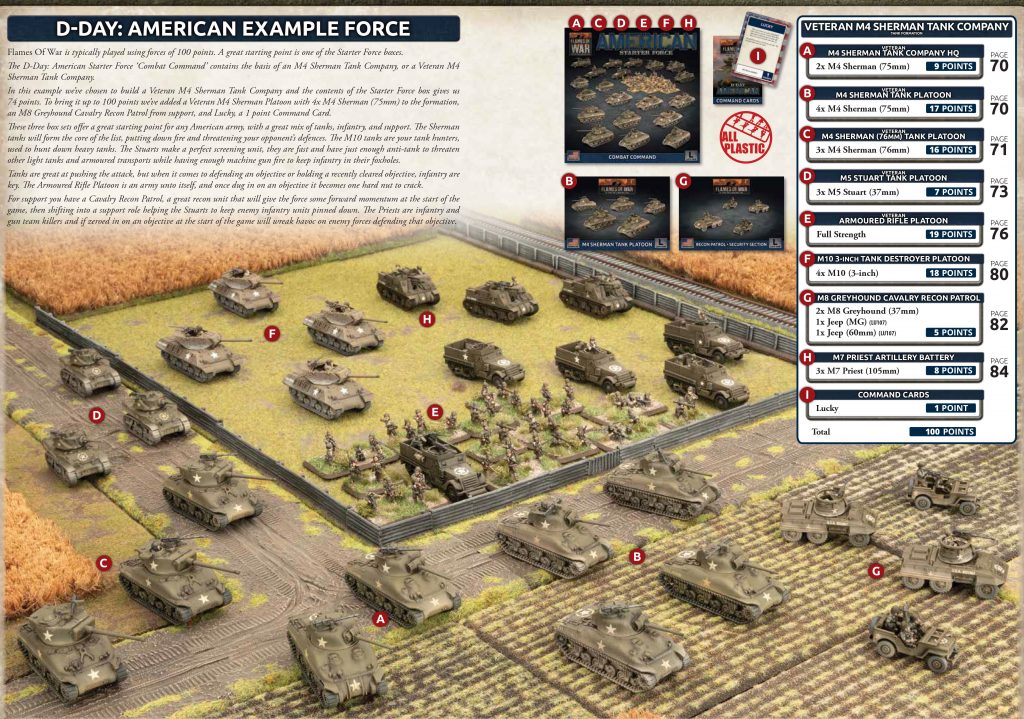with Phil Yates
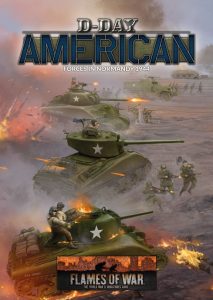
This gives an American commander a wide choice of forces, even though their equipment was standardised to maximise the benefits of Americsn-style mass production. Do you want to field fresh, eager troops, available in significant numbers, or do you want to field the less common desert veterans. Are you content with regular army troops, or do you want a small, elite strike force?
What’s In The Book?
Parachute Rifle Company
- Hard-as-nails volunteers. Fearless and trained exceptionally hard, so ready for anything.
- Ready for anything. Platoons include riflemen, light machine-guns, mortars, and bazookas.
- Platoons can be further reinforced with extra bazookas and light machine-guns.
- Light infantry, so few integrated weapons. Just mortars, pack howitzers, anti-tank guns, and recon jeeps.
- Can parachute into battle in airborne assault missions.
- Regular army troops can provide tanks and heavier fire support.
- Tanks, who needs tanks? I’ll just rip it apart with my bare hands!
Glider Rifle Company
- Large rifle platoons reinforced with light machine-guns, mortars, and bazookas.
- Platoons can be further reinforced with extra bazookas and mortars for more firepower.
- Small, hard-hitting formation with just two rifle platoons, heavy machine-guns, mortars, anti-tank guns, and pack howitzers.
- Can land by glider in airborne assault missions.
- Take the objective, then hold it with massed firepower.
- Easy to convert from Rifle Company in Fortress Europe.
Ranger Company
- Deadly assault troops who rally and hit in assaults on 2+!
- Small, elite platoons with flexible organisation including mortars and bazookas if needed.
- Compact company of two range platoons makes it easy to scale. Take as many or few companies as you need.
- Scale impassable cliffs with ease.
- Lead the way in assaults.
- Easy to convert from Rifle Company in Fortress Europe.
Assault Company & Veteran Assault Company
- Rifle company reorganised to spread the risk for assault landings.
- Up to six small platoons with plenty of weaponry: rifles, bazookas, mortars, and flame-throwers.
- Either normal support platoons or integrated platoons with both a heavy machine-gun and a mortar, escorted by riflemen.
- Swarm the enemy, pushing through any weak spots found.
- Field as desert veterans – better tactics, less gung ho.
- Easy to convert from Rifle Company in Fortress Europe.
Rifle Company & Veteran Rifle Company
- Cost-effective infantry with large, cheap platoons that can withstand a lot of enemy fire.
- Platoons can be further reinforced with extra bazookas and light and heavy machine-guns for more firepower.
- Formation has integrated heavy machine-guns, mortars, anti-tank guns, and artillery.
- New 57mm anti-tank guns and 105mm light howitzers.
- American riflemen manoeuvre quickly at dash speed.
- Field as desert veterans – better tactics, less gung ho.
- Fire and manoeuvre. Lots of artillery and firepower to support rapid assaults.
- Easy to convert from Rifle Company in Fortress Europe.
M4 Sherman Tank Company & Veteran M4 Sherman Tank Company
- Cost-effective medium tanks with integrated support.
- Stabilisers for greater volume of fire on the move.
- Up-gun an M4 Sherman platoon to 76mm guns for more anti-tank punch.
- Heavy fire support from M4 Shermans armed with 105mm howitzers and half-track mounted 81mm mortars.
- Flexibility. Can swap out a platoon of M4 Shermans medium tanks for a platoon of M5 Stuart light tanks.
- Field as desert veterans – better tactics, less gung ho.
- Grab their nose, manoeuvre to the flank, kick them in the butt.
- Easy to convert from M4 Sherman Tank Company in Fortress Europe.
M5 Stuart Tank Company & Veteran M5 Stuart Tank Company
- New upgraded M5 Stuart light tank.
- Exceptionally fast, ideal for flanking manoeuvres.
- Cheap light tanks with light and fast M8 Scott or heavy M4 Sherman assault guns as artillery support.
- Flexibility. Can swap out a platoon of M5 Stuart light tanks for a platoon of M4 Shermans medium tanks.
- Field as desert veterans – better tactics, less gung ho.
- Speed around the enemy flank to seize the objective before they can react..
- Easy to convert from M5 Stuart Tank Company in Fortress Europe.
Armoured Rifle Company & Veteran Armoured Rifle Company
- Armoured M3 half-tracks for battlefield mobility, even under fire.
- A weapon for every occasion.
- Platoons have riflemen, light machine-guns, mortars, bazookas, and half-track-mounted machine-guns.
- Formation has integrated heavy machine-guns, mortars, anti-tank guns, and self-propelled artillery.
- New 57mm anti-tank guns and M8 Scott light assault guns.
- Massed firepower overwhelms the enemy when attacking and shoots down any attack.
- Field as desert veterans – better tactics, less gung ho.
- Large, resilient platoons withstand a lot of enemy fire.
- Easy to convert from Rifle Company in Fortress Europe.
M10 Tank Destroyer Company
- Massed self-propelled anti-tank guns, with up to 12 in a company.
- Up to three security sections for perfect initial deployment, spearheading into No Man’s Land to flank enemy tank attacks.
- New M20 scout car in HQ and security sections. Fast and well-armoured.
- Use Seek, Strike, and Destroy doctrine to blitz into position and then scoot back out of sight after shooting up the enemy.
- As mobile as a medium tank, and almost as well armoured, but fewer machine-guns and no top armour, so stay away from enemy infantry.
- Easy to convert from M10 Tank Destroyer Company in Fortress Europe.
Support
- New M8 Greyhound armoured car mounting 37mm gun operates with machine-gun and mortar armed jeeps as well-armed cavalry recon.
- New 3-inch towed tank destroyer for solid anti-tank firepower.
- New L4 Grasshopper air observation post makes sure that your artillery are always on target.
- New M12 155mm self-propelled gun for heavy artillery support and bunker busting.
- Three batteries of towed 105mm or self-propelled M7 Priest or M12 155mm artillery give American forces powerful artillery support on top of the integrated artillery in formations.
- Time on Target rule allows supporting artillery to make enemy infantry and guns re-roll successful saves for extra deadliness.
- New P47 Thunderbolt fighters armed with eight machine-guns, bombs, and HVAR rockets have the right weapon for any target.
- New M15 and M16 self-propelled AA guns. Mix of 37mm guns for punch and quad .50 cals for volume of fire.
How Do the Americans Play?
The Americans have three basic varieties of troops in D-Day: American. You can field elite paratroopers and rangers, regular troops fresh into battle, or experienced veterans. Each of these has a different play style.
The elite paratroopers of the parachute rifle company are a new experience for American players. They are some of the best infantry in the game, being rated as Fearless, Veteran, and Careful. On their own, they need to be aggressive as they don’t have the long-range firepower to stop the enemy from sitting back and picking them off, but used this way they can be hard to stop. Given tank-destroyer and artillery backup, they also make excellent defensive troops, so you can swing either way.
The other elite option, the rangers, are more assault oriented, being Aggressive, so easier to hit, and rallying and hitting in assaults on 2+. If you sit around, you’ll get shot to pieces, but if you go for it, the rangers are hard to stop without killing every last one of them!
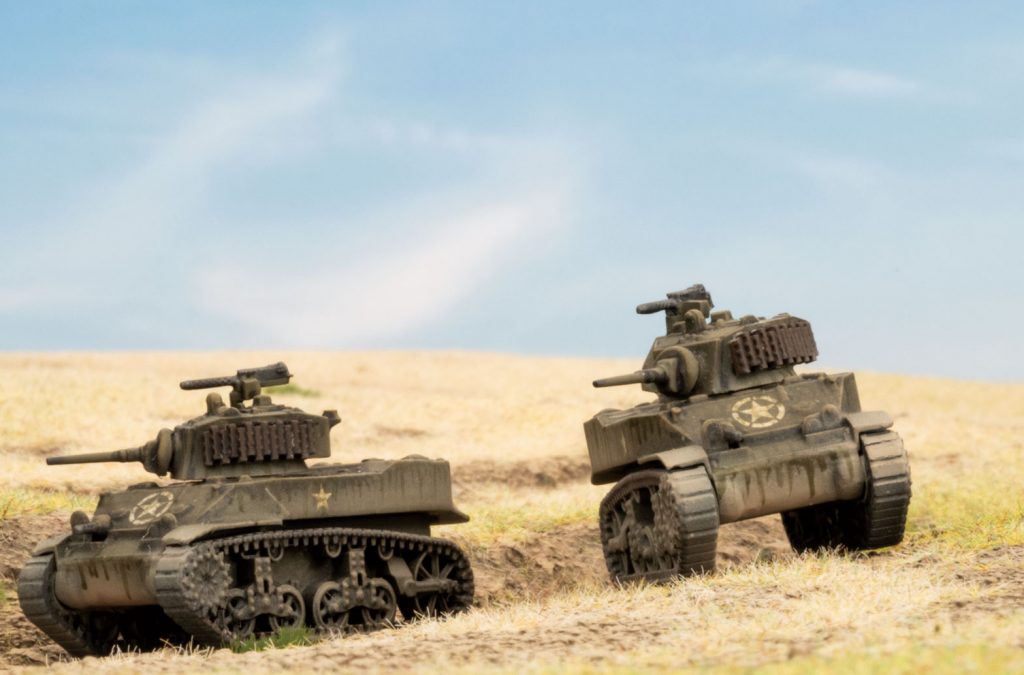
The veteran formations have learned what works and what doesn’t, so are rated as Careful, making them harder to hit, and have ‘Yankee Ingenuity’ pushing their tactics up to 3+. Of course, they’re no longer so ‘Blood and Gusts’ as the green guys. Their skill allows them to match the best, but they are more expensive in points, so your force is smaller, so tactics need to be more cautious.
The American strategy can be summarized in the phrase mobile tactics. They win by using their mobility, their ability to fire on the move, and their numbers to outflank their opponents and keep them off balance, while applying massed firepower to overwhelm any opposition.
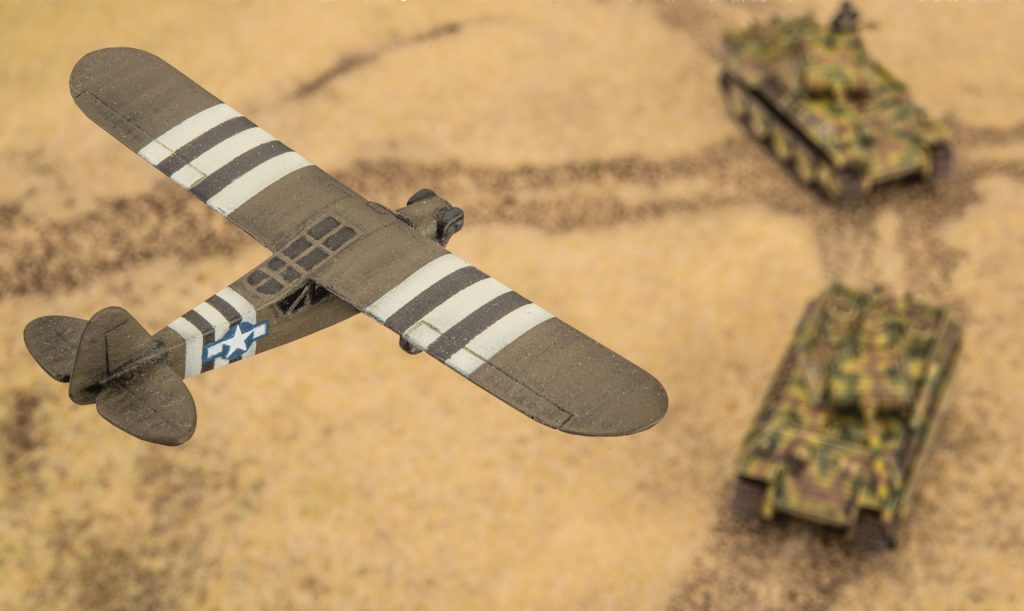
D-Day: American includes three new missions and a linked campaign. The first mission is Shot in the Dark, an airborne assault gone wrong with the attackers scattered across the board (and possibly off it) while the defenders attempt to organise a defence in the dark before the attackers reform and overwhelm them. It uses simple rules to reflect the chaos and uncertainty of airborne assaults.
The second mission is Help Is On Its Way, a refight of the Rangers’ battle at Pointe du Hoc. This mission uses the amphibious assault rules to bring the attacking forces ashore. A shortage of landing craft forces the attackers to land in multiple waves, which tanks to the attacker’s Overwhelming Force rule may include units from previous waves that have already been destroyed. The defenders have bunkers, nests, minefields, and barbed wire to delay the attack, while both sides hope desperately for assistance from a rescue force coming from inland.
The third mission is FUBAR (an acronym for Fouled Up Beyond All Recognition) which allows you to refight the bloody battles on Omaha Beach. This uses the same amphibious assault rules, but is a much more straightforward frontal assault into heavy defences with victory being determined by how fast, or even if, the American player can capture their objectives.
These three missions are linked together with two standard missions from the rulebook in a simple campaign where the outcome of one battle has an effect on the next. If the American player can make their final breakthrough in the fifth mission, they win the campaign.
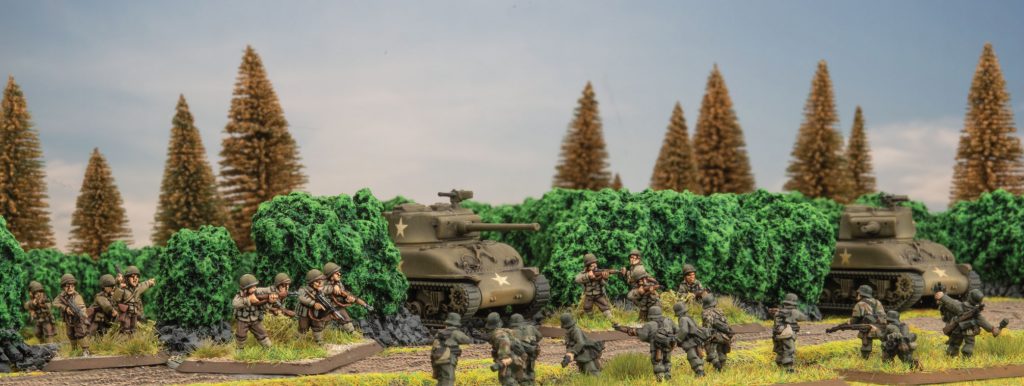
The D-Day: American book has four warriors: Norman ‘Dutch’ Cota, Lafayette Poole, James Earl Rudder, Turner Turnbull.
Norman ‘Dutch’ Cota, famous for leading his troops off Omaha Beach, showing them how an assault should be done, allows infantry under his command to attempt to charge again if they are driven back by defensive fire.
Lafayette Poole, America’s most successful tank ace, is ideal for leading your tanks’ advance. His men will follow him as he dashes forward, then when he gets close, his accuracy while firing on the move us unparalleled.
Turner Turnbull’s paratroopers refused to give up ground, no matter how many times the Germans attacked. His platoon’s defensive fire is virtually impenetrable.
James Earl Rudder led the rangers at Pointe du Hoc, steadfastly counterattacking any German penetrations into the rangers’ defensive positions.
Command Cards
The command cards introduce a new concept, title cards. These cards have the title of a division and a special rule giving the division’s flavour. The key is that you can only have one title in your force.
Title command cards for D-Day: American give you the option to field twelve new infantry divisions in addition to the two in the book. These allow you to customise your rifle company force to fight in many different ways. Some divisions give you new equipment, such as SMG-armed assault groups or M7 Priest assault guns as far of the formation. Others give your troops new abilities like attacking at night, riding tanks, navigating reserves to where they are needed, and improved artillery support. Most of the title cards give your division a different focus, trading out the ‘Blood and Guts’ rally bonus of the ‘yankee Ingenuity’ tactics bonus for other advantages.
Your tankers and armoured infantry aren’t left out, gaining the option to be the Free French ‘Division leClerc’, determined to liberate France or die trying. If they want to stay good ol’ boys from the US of A, they get lots of interesting equipment for their Sherman tanks: DD amphibious gear, Cullins hedgerow cutters, tank telephones, and sandbag armour.
The Americans are known for their love of fire support, and the command cards don’t disappoint, giving naval gunfire support, heavy mortars, air superiority, and new weapons loads for your P47 Thunderbolts including napalm and really big bombs!
If all this firepower seems to blunt to you, you can get all sneaky with the French resistance. They can mess with your enemy’s reserves or fight alongside you on the battlefield! And, when everything else fails, there’s always luck, with the Lucky card giving you a re-roll at the critical moment.
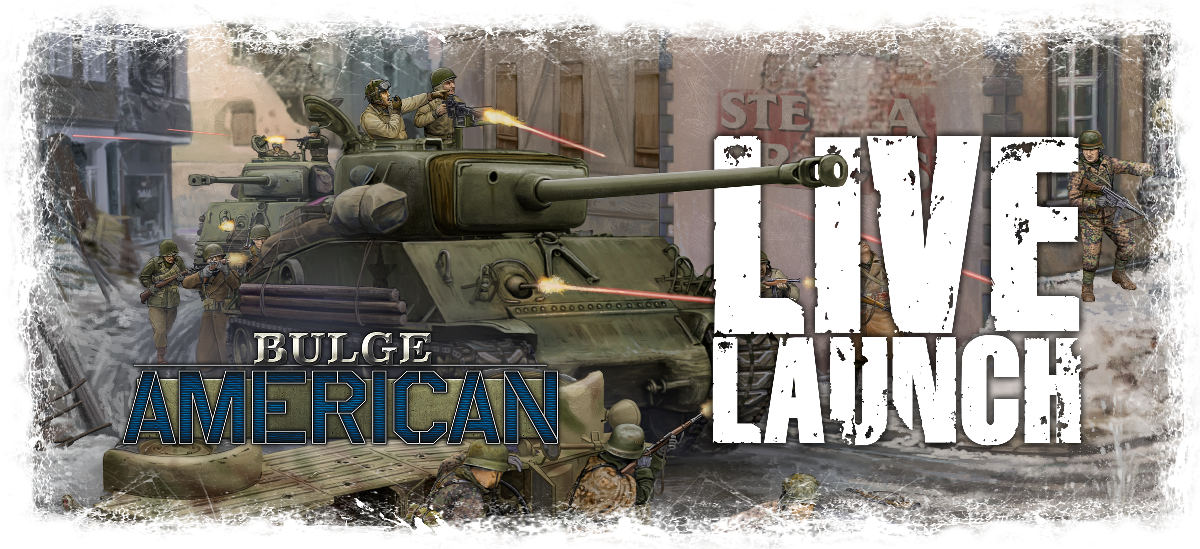
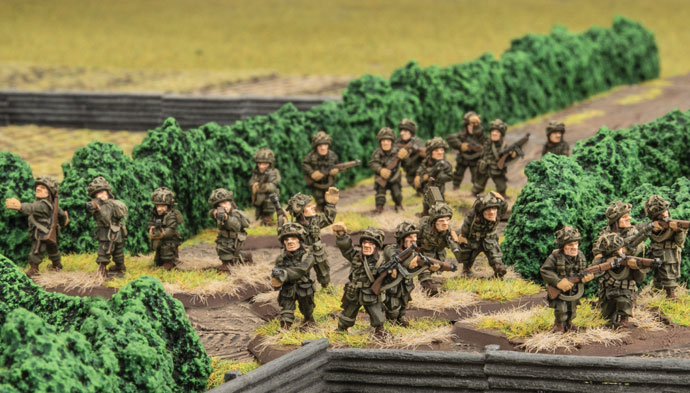 Glider Rifle Company
Glider Rifle Company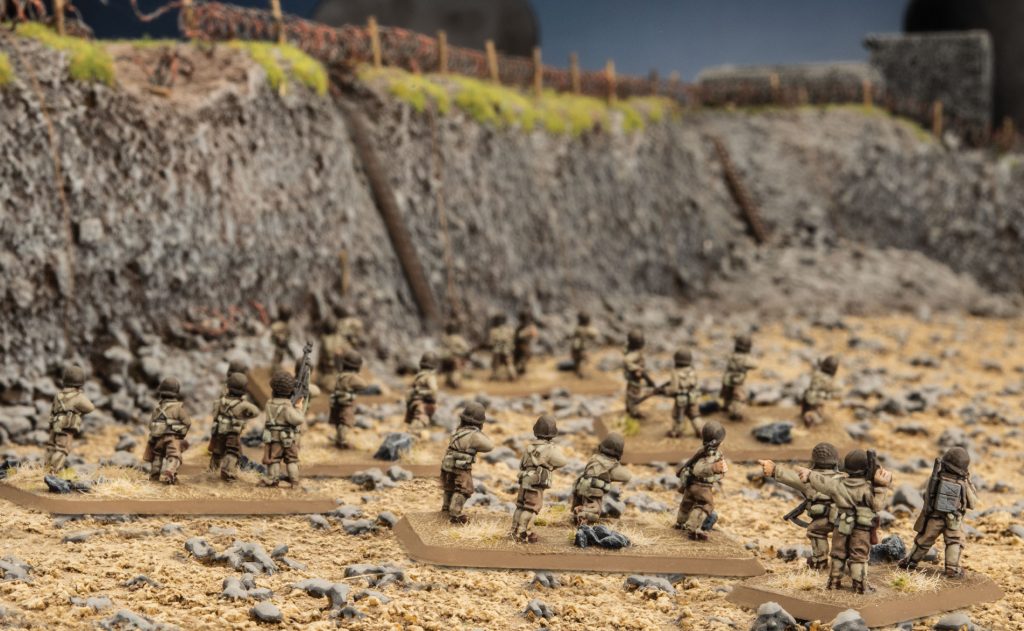 Assault Company & Veteran Assault Company
Assault Company & Veteran Assault Company Rifle Company & Veteran Rifle Company
Rifle Company & Veteran Rifle Company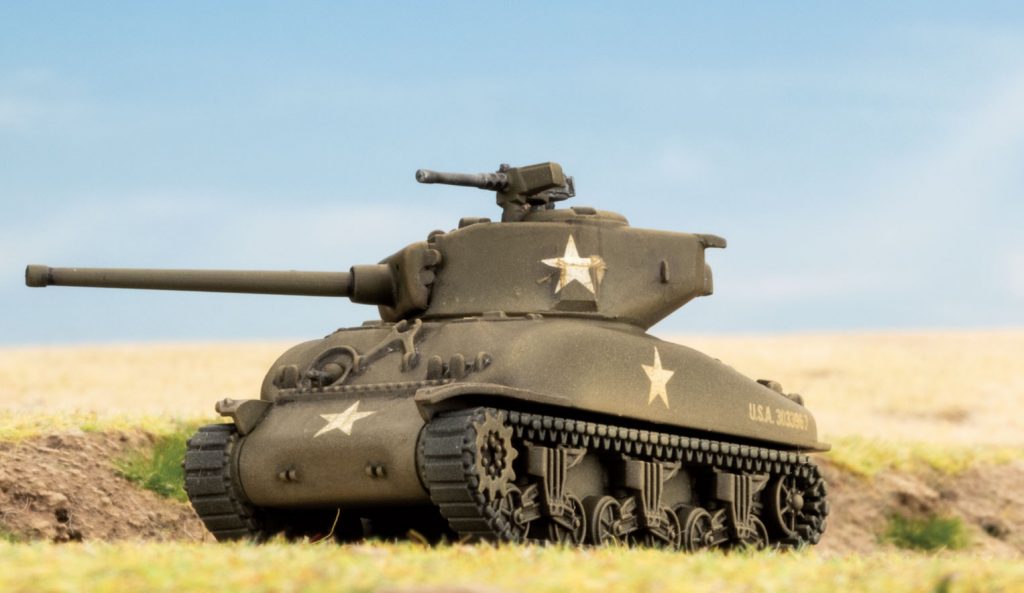 M5 Stuart Tank Company & Veteran M5 Stuart Tank Company
M5 Stuart Tank Company & Veteran M5 Stuart Tank Company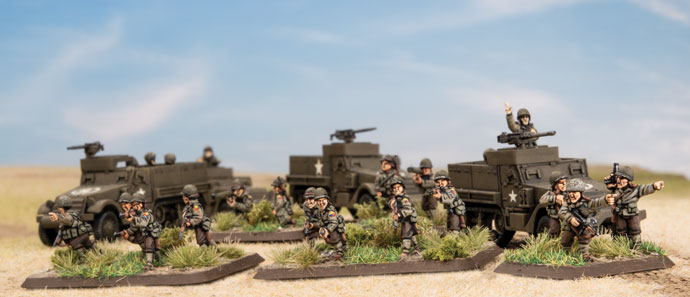 M10 Tank Destroyer Company
M10 Tank Destroyer Company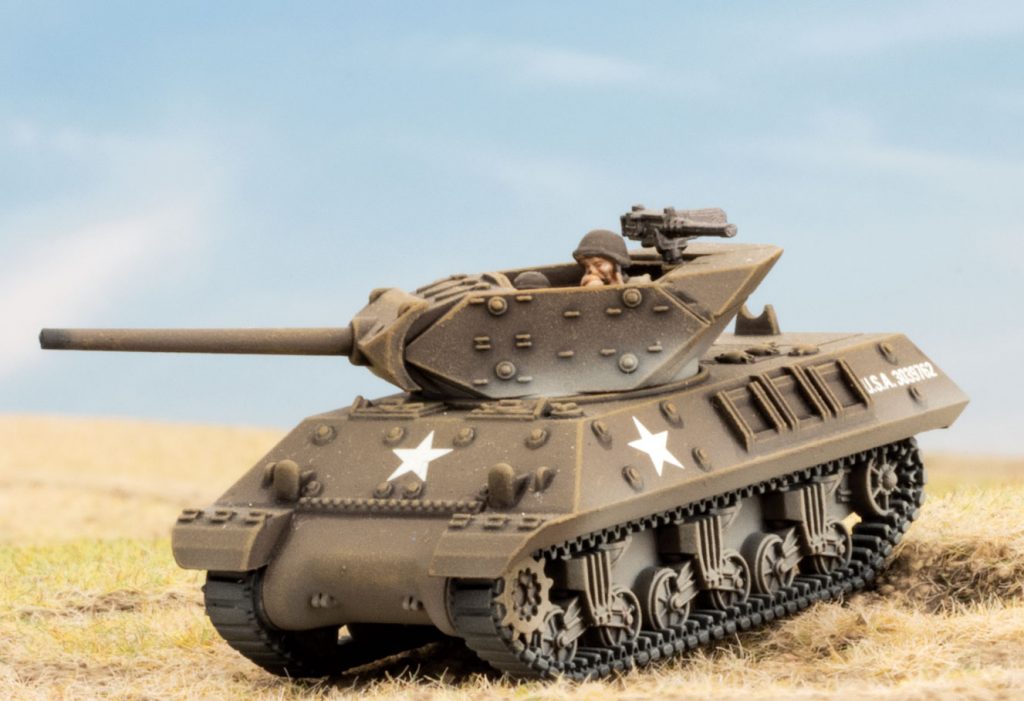 Support
Support